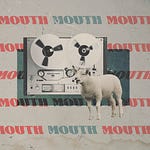For though I should walk in the midst of the shadow of death, I will fear no evils, for thou art with me. Thy rod and thy staff, they have comforted me. (Psalm 22:4 DR)
As the Salve Regina states, we “poor banished children of Eve” continually mourn and weep in this “valley of tears.” This life itself is that valley of tears, not because it was not created good or because we never experience joy or consolation, but rather because we are exiles here, far away from our true home.
The Psalmist uses a similar figure here for “this, our exile,” describing this world and the life we lead in it as walking in the “midst of the shadow of death.” The Vulgate here uses in medio umbræ mortis for “ in the midst of the shadow of death.” Umbræ means shade or shadow, and was often used figuratively for the dead, such as the shades of the dead in the underworld:
“The shadow of death” is of frequent recurrence in the Scripture; the proper meaning of which is that dense darkness, which shuts out all light, and is caused by death. The blind are said to be in darkness, because they see nothing; and with much more reason are the dead said to be so, because they feel nothing. Hence, the poets make the dead to dwell in shady places, wrapped up in darkness; and hence, the Scripture promiscuously uses darkness for the shadow of death, to explain one through the other, as in Job 3, “Let darkness and the shadow of death cover it;” and Job 10, “To a land that is dark, and covered with the mist of death;” Isaias 9, “The people that walked in darkness have seen a great light; to them that dwelt in the region of the shadow of death, light is risen;” in each of which passages “dwelling in darkness,” and “dwelling in the region of the shadow of death,” are used to signify the same thing. (St. Robert Bellarmine, A Commentary on the Book of the Psalms, 22, 4.)
The word umbræ could also carry the sense that it does in English of something that is the fleeting remnant or diminished reality of something, such as when we say “he is a shadow of his former self.” C. S. Lewis uses a similar figure in his work the Great Divorce, wherein the souls of those in Hell are transparent and misty and become more so they further the entrench themselves in their obstinance in sin.
This broad semantic range fits the Psalmist’s words here, for this “shadow of death” pertains to this world and its pleasures:
The shadow of death is the road of sin, on which that good-for-nothing bandit the devil spreads the nets of deception to catch those who are walking straight. It’s a shadow, because light has nothing in common with darkness. The apostle teaches us to repudiate the works of this shadow when he says, “Let us cast aside the works of darkness, and put on the armor of light; let us walk honorably as in the day, not in orgies and drunkenness, not in debauchery and shamelessness, not in quarreling and jealousy.” [Rom 13:12-13] So then, as long as you remain in this present life, you are walking in the midst of vices, of worldly pressures, which are the shadow of death. Let Christ shine in your heart, who lights the lamp of our minds with the love of God and neighbor; and you will not fear any evils, since he is with you. (St. Augustine, Sermon 366.5, The Works of St. Augustine, Vol. 10.)
Seen in this light, this world and all its delights and pleasures are but a shadow of our true homeland, for all the things of this world will pass away like a shadow. It is thus utterly foolish to cling to this world and its goods, for as the shadow lengthens at sunset and disappears when night falls, so man himself in all his pride is likened to this shade:
Man is like to vanity: his days pass away like a shadow. (Psalm 143:4 DR)
Origen of Alexandria notes that the Psalmist speaks of walking through this valley of death, rather than dwelling in the midst of it or trying to hurry through, and perceives a moral component to this:
To walk in the midst of the shadow of death is not the same as to sit in the shadow of death; one who sits in the shadow of death is firmly fixed in that shadow and strengthened in evil. On account of this, he is in darkness and lacks mercy so that the light may rise for him. He who does not sit, but who passes or walks through the midst of the shadow of death, not standing or hurrying across, does not walk alone because the Lord goes with him. (Origen of Alexandria, Selections from the Psalms, 23.4, ACCS.)
The great danger that we face in this world of evils is that we can become comfortable with those evils, and we can begin to allow the pleasures of this world to reorient our hearts and minds to it. This is the manner is which we can “sit” in the midst of the shadow of death, mistaking this world for our home and making our dwelling in that shadow of death, so that we become shadowy (as it were) in our own souls as well.
On the other hand, we can through presumption try to run ahead of our Lord and attempt to escape from this shadow of death, rather than walking with Him through it. In our pride we can rely on our own efforts or intelligence or self-righteousness and in doing so get out ahead of God and the grace He provides, rather than relying on Him and seeking after His will. St. Paul briefly describes the sting of my flesh that he was given—which was some form of demonic opposition—to curb his exultation in his vision of heaven:
And lest the greatness of the revelations should exalt me, there was given me a sting of my flesh, an angel of Satan, to buffet me. For which thing thrice I besought the Lord, that it might depart from me. And he said to me: My grace is sufficient for thee; for power is made perfect in infirmity. Gladly therefore will I glory in my infirmities, that the power of Christ may dwell in me. (2 Corinthians 12:7-9 DR)
To ask of the Lord to remove the sting was not wrong, but he learned through this experience how to rely on God’s grace through this suffering and how in that submission of will he would realize the power of Christ in him. He will go on to relate how the very weaknesses that we experience as we walk through the shadow of death become the means by which God’s power is manifest in our souls:
For which cause I please myself in my infirmities, in reproaches, in necessities, in persecutions, in distresses, for Christ. For when I am weak, then am I powerful. (2 Corinthians 12:10 DR)
The popularity and beloved-ness of Psalm 22 has made many of its phrases become saccharine sounding through overuse and the contempt of familiarity. After all, it sounds nice that we need not fear evils since Thou art with me. However, this should not be confused with an absence of suffering or never having to face difficulty or evil, for the reason the Psalmist doesn’t fear evils is not that they don’t surround him, but rather because Thou art with me. As St. Paul described above, this presence of God in the midst of the shadow of death inevitably means that those who follow after the shepherd will walk though great suffering and experience troubles of all kinds. These become not the signification of God’s absence, but rather the indication of His nearness:
“I will not desert you,” he says through the prophet, “nor abandon you.” [Joshua 1:5] Again in the gospel, “Behold, I myself will be with you every day until the close of the age.” [Matthew 28:20] Your guardian is reliable; the Lord your God is with you. Beware of deserting this companion of yours by being boastful, and of remaining deserted yourself in the shadow of death. (St. Augustine, Sermon 366.5, The Works of St. Augustine, Vol. 10.)
The sufferings and buffetings that we receive as we walk through this shadow of death are also used by God to strengthen and correct us, which the Psalmist now speaks of in terms of the rod and the staff of the shepherd. It might seem odd that these implements of correction and discipline are spoken of as bringing “comfort,” but the Psalmist is right to do so, for the Lord corrects those whom He loves (cf. Proverbs 3:12), and this discipline is the proof of one’s sonship. St. Paul invokes the language from this Psalm, speaking of the Lord’s discipline as a “consolation:”
And you have forgotten the consolation, which speaketh to you, as unto children, saying: My son, neglect not the discipline of the Lord; neither be thou wearied whilst thou art rebuked by him. For whom the Lord loveth, he chastiseth; and he scourgeth every son whom he receiveth. (Hebrews 12:5-6 DR)
It is this correction and discipline that allows us to walk through the shadow of death without turning aside or falling behind or getting ahead, but following the path the shepherd desires for us:
And make straight steps with your feet: that no one, halting, may go out of the way; but rather be healed. (Hebrews 12:13 DR)
The stings in the flesh that we receive should thus be of great comfort, for they are our Lord’s way of reproving and correcting us, of leading us through the darkness of this world. We who walk in the shadow of death do not know the way, nor can we know all the dangers which lurk on every side. Our Lord, however, is the light of the world and the One sure guide to reach our true homeland. Sometimes the brightness of His light is painful for our shadow acclimated eyes, but these chastisements are meant to turn our wills to Him, to cooperate with the grace that He provides in the path that He has chosen for us. These corrections are thus painful, but their fruit brings consolation:
Scripture is a witness that “rod” speaks of punishments and scourges. If you have sinned and see the rod of God threatening you, know that the mercy of God will not be far from you. (Origen of Alexandria, Selections from the Psalms, 23.4, ACCS.)
This rod and staff speak to God’s support of us in our weakness and His correction of us in our failings and sins, and have a corollary of the errors we must avoid of presumption and despair. We must never presume upon God’s grace, but neither must we despair of His mercy. As the sheep trusts the shepherd so we must wholly place ourselves in His hands, trusting Him to guide and direct and console and correct us:
And so, since you realize that you are being assailed in the shadow by the stratagems of the enemy intending to discourage you, take up the rod of discipline, and lean confidently on the staff of mercy, so that when Christ, “the sun of justice” [Malichi 4:2)], has shone upon you to help you, you may truthfully say, “Your rod and your staff have given me comfort.” (St. Augustine, Sermon 366.6, The Works of St. Augustine, Vol. 10.)
Both the rod and staff have therefore an action on God’s part and a moral corollary on our part as we cooperate with His grace.
The rod chastises and corrects and is meant to curb and herd our pride, to keep us from wandering from the narrow path. For our part we must subdue our pride and—like St. Paul—not glory in the gifts and good things we are given from God as if they come from ourselves or as is we have somehow arrived:
So remember the rod of correction and discipline, and don’t get conceited and proud when you have been filled with the good things of God’s gifts, and start grumbling against him; because in his anger he will shatter you with it like a potter's vessel. (St. Augustine, Sermon 366.6, The Works of St. Augustine, Vol. 10.)
The staff supports those who are weak and is the work of God’s grace to strengthen and assist us, both in the sacramental grace of Confirmation and in the graces He provides to resist temptation. And since God gives grace to the humble (cf. 1 Peter 5:5), the virtue of humility is the means by which we lean on this supporting staff, as it were, not trusting in ourselves but in the grace that God provides:
Remember too the staff of assistance, and don't trust in your own virtue, or ever say, “I am holy, I can't stumble.” Our weakness makes us liable to many slips and falls, nor is its dominant feature the holiness of its works while it is still set in earth that “produces thorns and thistles,” nor can it boast of any kind of purity. So as long as it is due to “return to the earth from which it was taken” [Genesis 3:18,19], it is unable, unless it is controlled by the staff of divine grace, to stand on its own feet. And so whether you are prospering in God, or whether you are being tossed about by storms of trials and temptations, throw yourself entirely upon the staff of God's mercy… (St. Augustine, Sermon 366.6, The Works of St. Augustine, Vol. 10.)
Finally, this rod and staff are fittingly a figure of the cross on which our Lord suffered and died:
You would not be wrong, however, to apply this to the saving cross: by its seal and remembrance we are rid of the hostile demons and guided to the true path. This is the meaning of “your rod and your staff comforted me:” the cross is assembled from two rods, with the upright staff confirming and directing those who believe in Him and strengthening those who are weak, and using the crossbar as a rod against the demons. (Theodoret of Cyr, Commentary on the Psalms, 22.3., ACCS.)
As we walk through the shadow of death—which is our exile in this life—we are therefore comforted by God’s correction of us by means of the rod in our sins and His support of us by means of His grace in the staff. These two concomitant realties are perfectly conjoined in the cross of our Lord Jesus Christ Who Himself passed through the shadow of death, taking our sins upon Himself and becoming obedient to death (cf. Philippians 2:8) so that:
When thou hadst overcome the sharpness of death, * thou didst open the Kingdom of Heaven to all believers. (Te Deum)
This is the cross by which the grace of God works through the rod and the staff, that self-same grace which was poured out into the world from the side of Christ on the cross:
[G]race descends into us through the Crucified Word. We were not only inept to take up grace on account of (our) ignorance of the divine precepts, yes indeed, also on account of our infirmity and impotence and concupiscence for earthly things: for that reason the Lord wanted to prop (us up). To heal our languors, He descended into us through the Crucified Word. Whence the Apostle to the Ephesians: “God, who is rich in mercy, on account of His exceeding charity, with which He has loved us; when we had died with sins, vivified us together with Christ, by whose grace we have been saved.” We have been vivified by Christ through Christ, because Christ has triumphed from death; whence death could not absorb Him, rather the Fount of life absorbed death, according to that which is written: “I will be thy death, O Death!.” Otherwise we could not be healed and saved. Whence the Apostle to the Galatians: “I do not throw away the grace of God; for if justice (is) through the Law, therefore Christ died without recompense;” However Christ has died, to resuscitate the dead for the taking up of life and grace; therefore grace is flowed into us through the Incarnate Word and through the Crucified Word. -- And the Blessed Virgin took up that Word (that is) “full of grace;” and the stream of graces has come forth from the side of Him, who has the efficacy to heal us. (St. Bonaventure, Conferences on the Seven Gifts of the Holy Spirit, Conference I., Part I., Section B., 2.)
I wanted to keep it somewhat simple for this animation, but still have something somewhat striking. I found this silhouetted image of someone walking or standing and isolated it in Photoshop and brought the image into After Effects and precomped it. I then drew something of floor plane leading to an illuminated entrance, kind of like a door slightly ajar leading to an illuminated room. I added in a bunch of glows and such to emphasize the contrast between light and dark and animated the opacity of some of the effects to get the pulsing light.
I then added in some particles (which are hard to see in the .gif) and a bit of camera shake to give it a little more movement. It’s pretty subtle overall, but I think it turned out nicely.
Enjoy.
For though I should walk in the midst of the shadow of death, I will fear no evils, for thou art with me. Thy rod and thy staff, they have comforted me.
(Psalm 22:4 DR)
View a higher quality version of this gif here:













Share this post